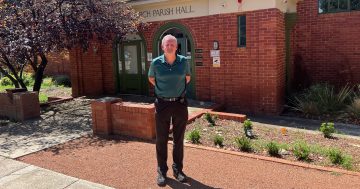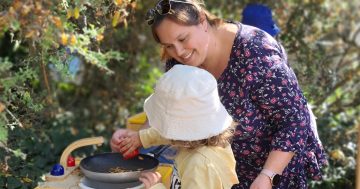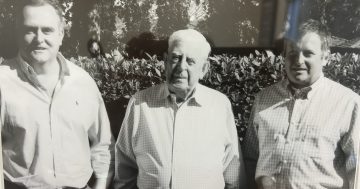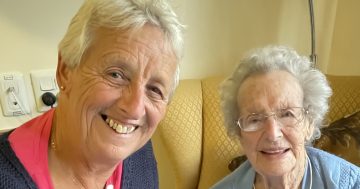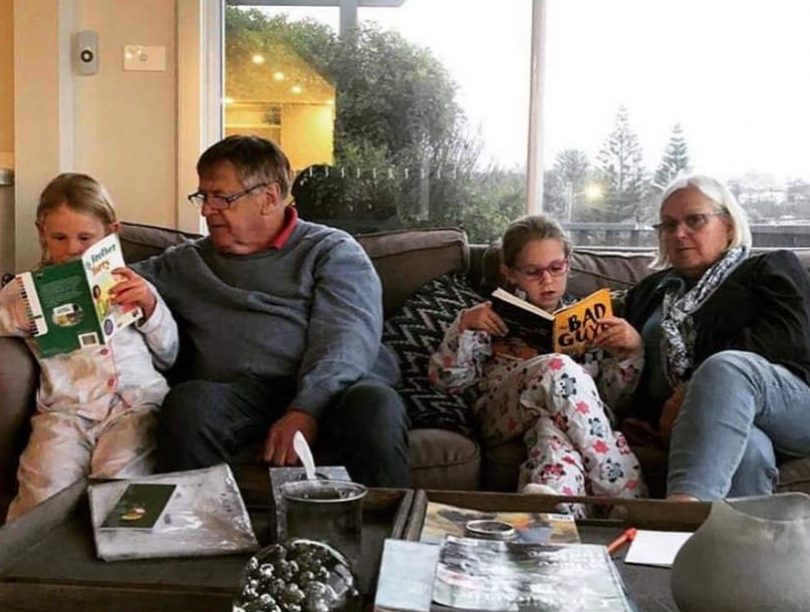
Anna Kemp in NSW wishes she could spend Father’s Day with her dad in Melbourne. Pictured is Anna’s dad and mum reading with her two eldest daughters, Louise and Emma. Photo: Supplied.
The pandemic is a running topic at the office, around the dinner table, and in news bulletins, but are we talking enough about the social impact of COVID-19, particularly for those separated from their families by state and international border closures?
A survey by the Australian Bureau of Statistics found that three in four Australians had weekly face-to-face contact with family or friends outside their household in 2014. However by mid-April 2020, just under half (48 per cent) could say the same.
Father’s Day is supposed to be a day of celebration, a time when families come together to say thank you to all father figures, past and present.
However for people such as Anna Kemp, the closest they will get to their father on Sunday is through a screen – via FaceTime or Zoom.
Ms Kemp lives in Crookwell, NSW, while her immediate family including her dad, Bill, lives in Melbourne.
“Father’s Day this year is going to absolutely suck, it’s going to be heartbreaking and I know my Dad is struggling massively,” Ms Kemp said.
The gravity of not seeing family during the pandemic hits home for the single mother of three girls on occasions such as Father’s Day.
To make matters worse Mr Kemp lives with Parkinson’s disease, which makes navigating FaceTime difficult. The family has also welcomed new arrivals since the pandemic began, but not everyone has had the chance to meet.
“My sister and brother both had babies in April. I’ve held one of my nieces but I’ve never held the other one and my kids have never met their cousins,” Ms Kemp said.
“All my Dad wanted for Father’s Day was to have his five granddaughters together for the first time, but he can’t and there’s a strong chance he won’t get that for Christmas either. Because my family is split, I only get my kids every other Christmas. I have them this Christmas but I won’t have them next Christmas, so it could be two years down the track before my Dad gets to see his five granddaughters together.
“All I want is to have a roast dinner and hug with my family.”
The last time the Kemps had dinner together was in April, to celebrate the arrival of Ms Kemp’s first niece.
The border between NSW and Victoria has since closed and there’s no knowing when it will reopen.
Ms Kemp could apply for an exemption to cross the border into Victoria, however she would need to self-isolate for 14 days on return and taking time off from her job as a school teacher is challenging.
“I don’t have any family or a partner here to help me through this, so I have to rely on my friends, who I am extremely grateful for, but it’s not the same,” she said.
This Father’s Day will also look different for those living in aged care homes.
On Friday, families in Sydney and on the Central Coast were eagerly awaiting chief health officer Dr Kerry Chant’s advice on whether they could visit aged care homes on Sunday.
Fortunately, it’s a slightly different story for aged care homes in regional NSW where cases have been low.
There have been only six cases of COVID-19 in the regional town of Yass and its aged care home was looking forward to welcoming visitors for a few hours on Father’s Day.
However visits will be restricted to two people and two hours, and social distancing rules will be in place during the visits.
Yass Valley Aged Care is also asking for visits to be limited to immediate family and people from the Yass district.
“Residents who do not have family, their friends are considered immediate family,” Yass Valley Aged Care chief executive officer Lyn Morgan said.
“Other visitors who fall outside those requirements can still visit externally through a window visit or via the lodge balcony. We have Zoom catch-ups available as required. Residents can go out for pre-arranged small family gatherings at a family home (not cafes, restaurants etc) but those have to be pre-arranged with admin and a risk assessment done with names etc of who will be attending.”
Original Article published by Hannah Sparks on About Regional.














